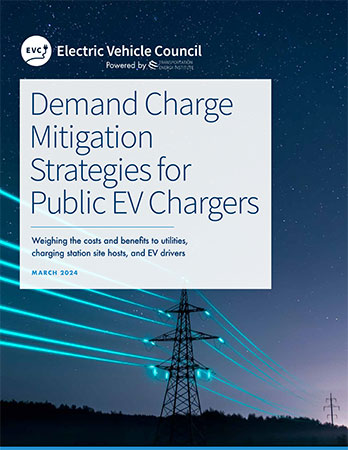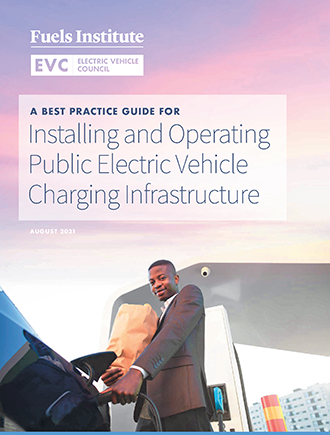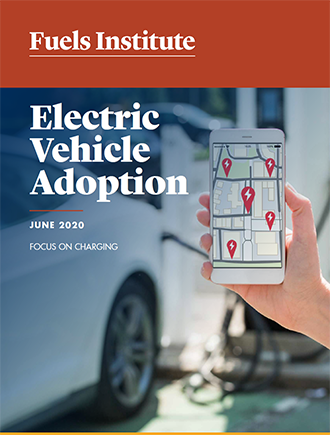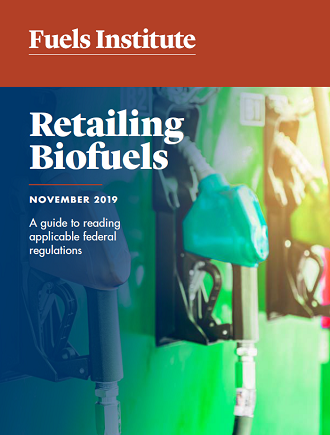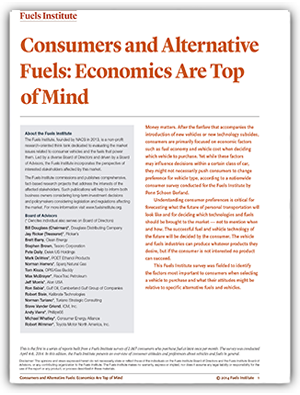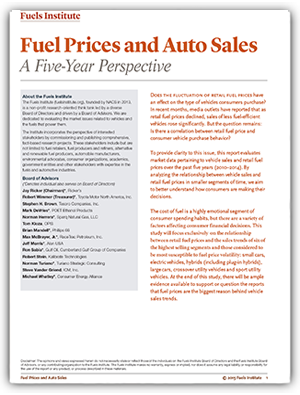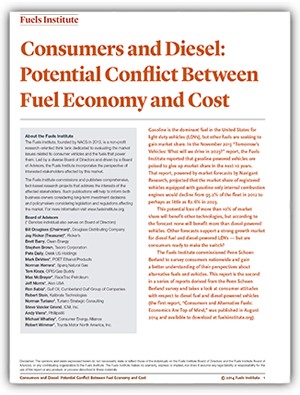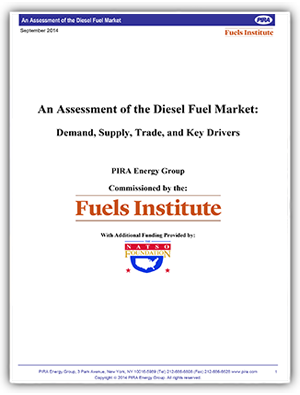All research publications of the Transportation Energy Institute will represent the work product of the Transportation Energy Institute alone, and will not be presented as reflecting the individual positions of any member of the Board of Advisors, the associated Task Group, or any organization helping to fund the research.
White Paper: Transportation Equity
Date: March 22, 2024 PDF: 1.8 MB Ensuring all consumers in all communities can benefit from the transportation energy transition is essential. No person should be left behind with less efficient, higher polluting transportation options simply because of where they live. The Transportation Energy Institute is committed to finding solutions that are accessible to underserved communities, including lower income, rural and tribal communities. A first step to achieving that objective is to understand how policies are designed to serve these communities. This whitepaper first describes what transportation equity is and how states/federal government have approached equity in transportation planning. It…
Read More
Demand Charge Mitigation Strategies for Public EV Chargers
Date: Feb 29, 2024 PDF: 3 MB Most experts realized establishing a robust and reliable public charging infrastructure to support the growing number of electric vehicles (EVs) on the roads will require a viable business model to encourage investment by private enterprise. Interested stakeholders, including many utilities throughout the nation, recognize that electric utility demand charges can have significant impacts on the business model of EV charging stations. High operating costs can make it difficult for charging station site hosts to recover costs or operate profitably. The Transportation Energy Institute’s Electric Vehicle Council (EVC) released this study to evaluate…
Read More
Back to the Future: 10 Years of Lessons Learned About the Vehicle Market
Date: August 3, 2023 PDF: 7.05 MB In 2013, we released our first report entitled, “Tomorrow’s Vehicles – What will we drive in 2023?” Now that it actually is 2023, the Institute has teamed up with Guidehouse Insights (whose analysis powered that report back in 2013 when they were known as Navigant Research) to review those forecasts and evaluate what major developments have occurred over the past 10 years that disrupted the market’s trajectory. Understanding what changed and why might better prepare us to critically review the uncertainties of current forecasts about the transportation energy market. In this report,…
Read More
Consumer Survey: Driving Behavior and Alternative Vehicles
Date: June 8, 2023 PDF: 20.7 MB Will consumers accept and embrace the transition to electric vehicles (EVs)? A new consumer survey report from the Transportation Energy Institute seeks to better understand consumer sentiment by exploring how consumers use their vehicles today, what type of vehicle they might purchase next and how they view the growing market of EVs. What consumers say they might be willing to consider in the future is a good indicator of what they think today and how the market can satisfy their needs and expectations, but how they will actually proceed in the future…
Read More
A Best Practice Guide for EVSE Regulations
Date: October 18, 2022 PDF: 2 MB While many localities around the country are beginning to plan for EV growth, research has revealed that most states and localities that were surveyed had little to no policies at all respecting public EV charging. This is expected to change quickly in the next several years as states and localities recognize the need to prepare for the rise in electrification and receive funding from different sources. Many state and local officials for the first time will have to consider developing and implementing policies to expand infrastructure. This report harnesses the vast market…
Read More
EV Charger Deployment Optimization
Date: August 17, 2022 PDF: 8 MB The market for electric vehicles (EVs) continues to grow at an accelerating pace, yet there remains great uncertainty regarding how fast these vehicles will gain significant market share, how many chargers we will need, when and where we will need them and what kind of chargers will be required in different locations. Recognizing that billions of dollars would be invested in building out EV charging infrastructure, The Transportation Energy Institute’s electric Vehicle Council commissioned S&P Global Mobility to model what the demand for EV chargers might look like over the next 10 years…
Read More
Infrastructure Investment and Jobs Act Oversight Summary and Recommendations
Date: July 13, 2022 PDF: 5 MB With $7.5 billion on its way for ZEV infrastructure, the Transportation Energy Institute Electric Vehicle Council provides you with a summary of the programs (NEVI Formula Program and Corridor Charging Grant Program) to help you navigate your way to financial support. We also are actively participating with the Department of Energy’s Vehicle Technology Office and Office of Electricity, who have developed a working group to assess the many gaps in industry and public education which exist today. Please fill out the form below to download the full report.
Read More
The Case for Developing an ESG Plan
Date: May 4, 2022 PDF: 9 MB This new Transportation Energy Institute white paper aggregates developments over the past several years to demonstrate the importance of ESG principles to the market. The evidence is clear that ESG is not a new phenomenon and is not a temporary consideration – it is becoming deeply embedded within society and businesses who ignore it do so at their own peril. “Inaction is no longer a viable option. Remaining silent when it comes to ESG values speaks volumes about a company’s perceived values.” Please fill out the form below to download the full…
Read More
Evaluation of Policies for Electric Vehicle Charging Infrastructure Deployment
Date: March 01, 2022 PDF: 315 KB Transportation Energy Institute Study Evaluates EVSE Programs to Discover Features That Are Most Successful The availability of electric vehicle (EV) charging infrastructure, formally referred to as electric vehicle supply equipment (EVSE), is a primary concern with respect to developing an EV and EV charging market in the U.S. Over the last decade, federal, state, and local governments; utilities; and other stakeholders have introduced new policies, programs, and incentives to support and accelerate both the adoption of EVs and the deployment of EVSE. Policies for Electric Vehicle Charging Infrastructure Deployment was developed by…
Read More
Life Cycle Analysis Comparison: Electric and Internal Combustion Engine Vehicles
Date: January 25, 2022PDF: 4 MB This report evaluates and compares the life cycle environmental impact of internal combustion vehicles and electric vehicles (ICEV, BEV and HEV) and the energy sources that power them, as well as the corresponding total cost of ownership that affects consumers. This report leverages findings from existing literature and research from government agencies, private corporations, and academic institutions as well as from a customized life cycle assessment model developed specifically to verify and test the findings of the report. The report was developed to inform stakeholders about the opportunities to improve the environmental performance of…
Read More
Retrofitting Convenience Stores for Electric Vehicle Charging
Date: October 01, 2021 PDF: 376 KB Many factors must be taken into account when retrofitting an existing facility for EV charging. Electrical installation and connectivity, construction costs, tax credits and rebates, projected growth of EVs in the market, station downtime, permitting requirements, competition, maintenance and upkeep, third party funding availability, and technology all require careful consideration. The Petroleum Equipment Institute (PEI), NACS and the Transportation Energy Institute have developed this document to help convenience retailers who are considering whether to incorporate electrical vehicle (EV) charging infrastructure into existing liquid fuel sites. Please fill out the form below to…
Read More
Future-Proofing Convenience Stores for Electric Vehicle Charging
Date: October 01, 2021 PDF: 333 KB Incorporating critical future infrastructure needs into store design will enable the retailer to add EV charging services whenever the timing is right while minimizing costs to retrofit the facility. Preplanning is important because new stores are 20+ year assets, and industry experts project that EVs will acquire a significant market share during this time. The Petroleum Equipment Institute (PEI), NACS and the Transportation Energy Institute have developed this document to help convenience retailers plan for electric vehicle (EV) charging infrastructure at new liquid fueling sites. With careful planning and efficient site design,…
Read More
Installing and Operating Public Electric Vehicle Charging Infrastructure
Date: August 06, 2021 PDF: 3.1 MB This report analyzes the issues site hosts are expected to encounter as they contemplate development of public EV charging by separating them into three key buckets: Assessing the business case Utility engagement Working with local authorities having jurisdiction over the sites location The report also presents several case studies from early adopters who've invested in the public EV charging space. In addition, the report includes crucial lessons learned from real world experience. Please leave your information below to download the full report.
Read More
EV Consumer Behavior
Date: June 14, 2021 PDF: 3.66 MB This report analyzes and presents findings from various publicly available and reliable sources to answer five key questions: Who is the EV customer? When and where does the EV customer recharge? Why does an EV customer choose a particular recharging facility? How do EV customers interact with charging equipment? What do EV customers do at facilities while charging? Beyond a simple literature review, this report used these insights to create five relatable personas representing potential future EV drivers. This approach helps bring to life how different drivers might use their EVs and…
Read More
EV Market Regulatory Report
Date: April 21, 2021 PDF: 4.04 MB The EV market is expanding rapidly and so are policies supporting its growth. This report serves as an invaluable resource to guide the development of regulations affecting the installation and operations of electric vehicle service equipment (EVSE).
Read More
State of Transportation Energy and Vehicle Electrification
Date: August 21, 2020 PDF: 1.2 MB The transportation market is transitioning to lower-carbon-intense sources of energy and more efficient use of existing energy resources, but the transition is proceeding at an evolutionary pace. While many are advocating a rapid transition to an electrified transportation market, this report takes an objective look at the realities of the market and the broad mix of powertrains moving people from one place to another.
Read More
Electric Vehicle Adoption: Focus on Charging
Date: June 01, 2020 PDF: 5.32 MB An evaluation of the electric vehicle market from the consumer perspective, including total cost of ownership, recharging infrastructure requirements, anticipated consumer recharging behavior, and the relationship of EVs to competing technology in terms of consumer adoption. Download Brief Please leave your information below to download the full report.
Read More
Literature Review Summary - Supercharged: The Environmental Impact of Electric Vehicles
Date: October 29, 2019 PDF: 0.99MB The electric vehicle (EV) has earned a reputation for being eco-friendly, but tailpipe emissions capture just a snapshot of their complete environmental impact. The Transportation Energy Institute undertook a literature review to assess how the lifecycle of an EV impacts the environment as compared to that of the internal combustion engine (ICE) vehicle. Please leave your information below to download the full report.
Read More
Tomorrow's Vehicles
Date: June 17, 2017 PDF: 376 KB "Tomorrow's Vehicles" is a series of three reports forecasting the market shares of the vehicles expected to be sold and driven in the United States and Canada through the year 2025, the current target date of federal fuel efficiency standards. Utilizing current market conditions and trends, the reports forecast sales and registrations of light and medium/heavy duty vehicles, broken down by powertrain, and each market segment's relative fuel consumption through 2025. As performance and efficiency regulations become increasingly stringent, it is vital to shed some light on the potential impact on the…
Read More
Tomorrow's Vehicles: What will we drive in 2023?
Date: November 01, 2013 PDF: 3.29 MB Innovation in the vehicles market is moving forward at a very rapid pace, but is that pace fundamentally changing the future composition of the fuels market? According to market forecasts completed for the Transportation Energy Institute by Navigant Research, the answer is “yes,” but only to a limited degree. Within the next 10 years, alternative fuel drivetrains will gain market share. However, traditional petroleum-powered internal combustion engines will continue to dominate. Please leave your information below to download the full report.
Read More
Decarbonizing Combustion Vehicles: A Portfolio Approach to GHG Reductions
Date: July 5, 2023 PDF: 19.5 KB Reducing greenhouse gas (GHG) emissions from internal combustion engine vehicles (ICEVs), while transitioning to zero-tailpipe emissions vehicles (ZEVs), will deliver the greatest environmental benefits in both the near- and long-term. This report evaluates the viability and emissions reduction potential of a variety of technology and energy options that can benefit the ICEV market and concludes that adopting a portfolio approach that matches low carbon strategies with different vehicle types and use cases is the most effective path for decarbonizing the transportation sector. The report presents a portfolio of options available to policymakers…
Read More
Future Capabilities of Combustion Engines and Liquid Fuels
Date: October 31, 2022 PDF: 9 MB The United States transportation sector includes nearly 300 million internal combustion engine (ICE) vehicles and American consumers are on pace to purchase another 14 million 2022. Despite the rapid increase in electric vehicle sales, the market will continue to be dominated by ICE vehicles for decades to come. In the pursuit of reducing carbon emissions from the transportation sector, finding solutions for these vehicles must be a priority. For this reason, The Transportation Energy Institute commissioned this new report, which presents a high-level summary of research and development projects focused on improving…
Read More
Assessment of Biofuels Policy: Effectiveness of Emissions Reductions
Date: June 14, 2022 PDF: 3 MB Biofuels have an opportunity to reduce the carbon intensity of liquid fuels and they must be part of the decarbonization strategy. The U.S. has more than 270 million combustion engine vehicles on the road right now. They need a lower carbon fuel option and biofuels represent the most immediate and viable option. Our latest white paper, “Assessment of Biofuels Policy: Effectiveness of Emissions Reductions,” explores the carbon benefits to using biofuels. This paper looks at fuel ethanol, biodiesel, renewable diesel and gasoline, hydrogen and R80B20, plus evaluating the policies that affect these fuels,…
Read More
The Easiest and Hardest Commercial Vehicles to Decarbonize
Date: April 05, 2022 PDF: 7 MBOur first report looks at the top five and bottom five applications for MHDV decarbonization as a function of technology readiness and quantifies each market’s impact on the overall U.S. MHDV market and contribution to U.S. MHDV GHG emissions.The report was intended to inform the broad community on the nuances of MHDV decarbonization.Executive Summary (PDF)Please fill out the form below to download the full report. Introducing the Studyhttps://www.youtube.com/watch?v=xk0TMBEoWIoSummary of Findingshttps://www.youtube.com/watch?v=tYPRVDgbLuMWebinar RecordingIn case you missed it, here is the recording of the webinar that we hosted with Guidehouse on this report.https://www.youtube.com/watch?v=h-hh5ylSWd4 Webinar Presentation (PDF)
Read More
Biomass-Based Diesel: A Market and Performance Analysis
Date: March 25, 2020 PDF: 3.5 MB Biomass-Based Diesel: A Market and Performance Analysis is a comprehensive overview of the current U.S. biomass-based diesel (biodiesel and renewable diesel) market, including supply, elasticity of demand, distribution, blending patterns, performance & efficiency characteristics. The study also evaluates the effects economic incentives and regulatory mandates have on retailers’ decisions to sell or consumer decisions to buy biomass-based diesel and what conditions would have to exist for the market to thrive without those incentives and regulations. Download Brief Download Executive Summary Please leave your information below to download the full report.
Read More
Retailing Biofuels: A Guide to Reading Applicable Federal Regulations
Date: November 12, 2019 PDF: 202 KB This report compiles all of the federal regulations and third party standards applicable to storing and selling biofuels, including those mandated by the U.S. Environmental Protection Agency, the Federal Trade Commission and Occupational Safety and Health Administration. The report will assist retailers and other interested stakeholders keep up with new liquid fuel offerings by serving as the single resource needed to navigate applicable federal regulations, liability concerns, penalties for non-compliance and compliance options. Please leave your information below to download the full report.
Read More
The Case of E15
Date: February 01, 2018 PDF: 5 MB A comprehensive assessment, presented as individual case studies, of retailer experiences selling E15, including the decision process, requirements to sell E15, equipment configurations, marketing strategy and consumer response. Please leave your information below to download the full report.
Read More
Consumers and Alternative Fuels 2017
Date: December 08, 2017 PDF: 5 MB This report is based upon an annual consumer survey exploring the attributes most important to consumers when buying a new vehicle, including the importance of alternative powertrains such as electric and diesel powered vehicles. The report analyzes survey results in terms of fuel prices and vehicle sales to better understand consumer choice and the relationship between what consumers say they might do and what they do in actuality. The survey data itself is a strong indication of where consumer behavior may trend in the future, despite actual recorded behavior at dealership sales…
Read More
New Technology Adoption Curves - A Case Study on Delivering E25-Capable Vehicles to Market
Date: June 13, 2017 PDF: 856 KB Our latest report - a case study exploring the time it would take a new technology to reach 20% vehicle market share (the percentage of market penetration we believe sufficient to satisfy consumer demand). The case study evaluates how many vehicles equipped to operate on E25 must be sold each year to achieve a 20% share of vehicles on the road by a certain moment in time. The case study serves as an example of what will be required to achieve significant market penetration for any new technology. Please leave your…
Read More
Retailing E85: An Analysis of Market Performance, July 2014-August 2015
Date: March 23, 2017 PDF: 11.5 MB Analysis of the E85 retail market over a 13-month period from 620 E85 retail locations. Download Brief Please leave your information below to download the full report.
Read More
E85 - A Market Performance Analysis and Forecast
Date: November 01, 2014 PDF: 3.04 MB E85 is subject to the fuel specification standard used by ASTM which applies to fuel blends that contain 51% - 83% ethanol. The U.S. Energy Information Administration (EIA) uses an average ethanol concentration of 74% for its evaluations. Please leave your information below to download the full report.
Read More
Consumers and Alternative Fuels: Economics Are Top of Mind
Date: April 01, 2014 PDF: 220 KB An analysis of what consumer are looking for when purchasing a vehicle and how they feel about alternative powertrains and fuels. Please leave your information below to download the full report.
Read More
Looking Back at IMO 2020
Date: April 19, 2023 PDF: 925 KB Back in 2020, The International Maritime Organization issued the IMO 2020 sulfur reduction rule, whose intention was to get sulfur content down to 5,000ppm between 2020 and 2025. While the regulation was not universal, the IMO is made up of nearly 200 member countries that represent the most active shipping markets and ports throughout the world. This would have a significant impact on distillate prices and availability and be generally disruptive to refined fuels in general. What was once considered a potentially earth-shaking issue for the entire fuels market has since been…
Read More
Diesel Fuel Sampling Study: An Evaluation of Diesel Fuel Sold and Consumed in the U.S. Market
Date: December 01, 2021 PDF: 7 MB The Transportation Energy Institute’s Diesel Fuel Quality Council commissioned a fuel quality study to better understand the condition of diesel fuel sold and consumed in the U.S., and specifically, to evaluate diesel fuel for specific properties that may affect engine operations and/or contribute to tank corrosion and product contamination. The Council collected 190 nozzle samples and 134 tank samples from around the country and conducted 11 tests on every nozzle sample, six tests on every middle tank sample and five tests on every bottom tank sample. The report summarizes the findings of…
Read More
Diesel Fuel Loading and Delivery
Date: August 24, 2021 PDF: 377 KB A series of suggested practices to assist diesel fuel distributors - those transporting fuel from a distribution terminal to a retail or commercial facility tank - protect fuel quality and avoid costly contamination problems while loading and unloading fuel. Please leave your information below to download the full report.
Read More
Mexico Energy Reform Update: The Current Mexican Gasoline & Diesel Market
Date: March 31, 2021 PDF: 5MB In January 2020, the Transportation Energy Institute published Mexico’s Energy Reform: Impact of Mexico’s Deregulation and Liberalization of the Fuels Market. That report analyzed the Mexican fuels and vehicles market and evaluated the demand for fuel as well as the status of Mexico’s fuel distribution and retail infrastructure. More than one year after President Andrés Manuel López Obrador was elected, market conditions and the outlook for the fuels market in Mexico have changed. As a signatory nation of the U.S.—Mexico—Canada Agreement (USMCA), the status of Mexico’s energy reform is of significant importance to…
Read More
Diesel Storage Tanks: Industry Practices to Minimize Degradation and Improve Fuel Quality
Date: March 31, 2021 PDF: 302 KB New diesel engines are required to meet higher emissions and efficiency standards while also having a longer useful life. Therefore, modern diesel engines are consuming more diesel fuel in the engine’s lifetime than before. This interplay between modern engine design and fuel consumption highlights the importance for improved diesel fuel quality. Please leave your information below to download the full report.
Read More
Policy Considerations | Proposals to Ban the Sale of Combustion Engine Vehicles
Date: March 22, 2021 PDF: 295 KB To date, more than a dozen countries have announced their intent to ban the sale of new ICE-equipped vehicles. These countries represent almost half of the global light duty vehicle market. In response to these suggested policies, this tool was created to prompt discussion and encourage policymakers to carefully consider the potential implications of such a policy in order to mitigate negative and amplify positive outcomes.
Read More
Impact of Transportation-Related Environmental Initiatives
Date: October 27, 2020 PDF: 3.5 MB The global community is developing and implementing a wide variety of environmental initiatives to reduce emissions from the transportation sector. This report provides an overview of 37 such initiatives and an in-depth analysis of 14 of those movements to better understand their effectiveness in reducing emissions and their overall cost to society, including governments, industry and consumers. Download Brief Webinar Impact of Transportation-Related Environmental Initiatives Environmental Initiatives - Corporate Average Fuel Economy Related Resources Press Release: New Transportation Energy Institute report provides valuable context to guide consideration of transportation-related environmental initiatives…
Read More
Mexico's Energy Reform: Impact of Mexico's Deregulation and Liberalization of the Fuels Market
Date: January 24, 2020 PDF: 5.33 MB This report analyzes the impact of the recently implemented Energy Reform on the country’s present and future fuel demand, distribution and retail infrastructure, regulatory programs and composition of the vehicles market as well as the impact on U.S. market dynamics. Download Brief Please leave your information below to download the full report.
Read More
IMO 2020 Literature Review
Date: April 11, 2019 PDF: 568 KB A summary of more than 30 reports evaluating the impact of the International Maritime’s rule lowering marine sulfur limits to 0.5% mass/mass, effective January 1, 2020. The rule will affect the vehicle fuels market since refinery operations will have to change to meet the new marine fuel standard. Headlines have varied from the alarmist to the blasé, which is why the Transportation Energy Institute undertook this literature review. By assessing the analysis from leading experts in the market, this report provides a more even-keel, objective overview of the potential market implications of…
Read More
Transitioning the U.S. Gasoline Pool to a Single High-Octane Fuel: A Baseline Analysis
Date: March 21, 2019 PDF: 13 MB This report presents an understanding of the options for and feasibility of transitioning the market to a national high-octane fuel (HOF) to enable more fuel-efficient vehicle technologies. The report assesses the scalability and cost of viable fuel formulations, regulatory implementation strategies and potential consumer acceptance of a new fuel. It is meant to provide an analytical framework and a set of baseline results to facilitate further analysis of the possible transition of the U.S. gasoline pool to a national HOF. Please leave your information below to download the full report.
Read More
Analysis of the Potential for Increasing Octane in the U.S. Fuel Supply
Date: March 21, 2019 PDF: 4 MB A white paper written by the Transportation Energy Institute discussing findings from the Transportation Energy Institute’s Octane report in the context of research done by Co-Optima, USCAR and evolving policy discussions relative to HOF. The analysis presented in this white paper is exclusively that of the Transportation Energy Institute and does not reflect the opinion of any third party source of information. Please leave your information below to download the full report.
Read More
Market Reactions to Low Carbon Fuel Standard Programs
Date: February 22, 2019 PDF: 6 MB A comprehensive review of the California Low Carbon Fuel Standard (LCFS) to provide insight into the success and challenges of the program. The report includes the LCFS program’s evolving regulatory adjustments and compliance strategies, impacts on fuel supply and prices, and its effects on market participants. Download Brief Please leave your information below to download the full report.
Read More
Urbanization - The Effect of Urban Development on U.S. Vehicle Travel And Fuel Demand
Date: May 22, 2017 PDF: 411 KB An evaluation of more than 100 years of urban development in the U.S. from the perspective of individual mobility. Download Brief Please leave your information below to download the full report.
Read More
Assessment of the U.S. Fuel Distribution Network
Date: December 01, 2016 PDF: 9 MB The U.S. lays claim to one of the largest and most complex fuel-supply chains in the world. This report evaluates this supply chain, how it works and what limitations/weaknesses exist at each point to accommodate diverse fuel specifications and achieving higher rates of biofuels penetration. Download Brief Please leave your information below to download the full report.
Read More
Fuel Prices and Auto Sales
Date: July 01, 2015 PDF: 260KB A new study examines the widespread notion that retail fuel prices have a direct correlation on consumer vehicle purchasing behavior. By analyzing the relationship between vehicle sales and retail fuel prices over the past five years, we aim to better understand how consumers are making their decisions. Please leave your information below to download the full report.
Read More
Driver Demographics – The American Population’s Effect on Vehicle Travel and Fuel Demand
Date: December 01, 2014 PDF: 7.46MB An analysis of the historic growth and stabilization of vehicle-miles traveled, through a demographic examination of drivers and driver behavior. Download the brief. Please leave your information below to download the full report.
Read More
Consumers and Diesel: Potential Conflict Between Fuel Economy and Cost
Date: October 01, 2014 PDF: 210.65 KB A new consumer study examines consumer preferences toward diesel fuel and finds that while all consumers seek economic benefits, different consumer segments value different economic factors, and that these different needs all must be addressed in communicating diesel fuel's cost benefits. Please leave your information below to download the full report.
Read More
An Assessment of the Diesel Fuel Market: Demand, Supply, Trade and Key Drivers
Date: October 01, 2014 PDF: 2.36 MB Developed by the PIRA Energy Group, this report was commissioned by the Transportation Energy Institute to analyze domestic diesel fuel demand, production capacity, international demand and trade balances, as well as the various programs and requirements that might affect overall diesel demand. Please leave your information below to download the full report.
Read More
Policy Considerations: Emissions Reduction Proposals Affecting Medium and Heavy-Duty Vehicles
Date: December 19, 2022 PDF: 2 MB Medium and heavy-duty vehicles (MHDV) account for approximately 10% of vehicle miles traveled in the United States, distribute nearly three-quarters of the nation’s freight and contribute 24% of the nation’s transportation-related greenhouse gas (GHG) emissions (often expressed as carbon dioxide, or CO2 equivalent, or simply carbon) as well as a significant share of air pollutant emissions. In the quest to reduce emissions from the transportation sector, policymakers are beginning to explore options that will directly affect this sector. However, the MHDV market presents unique conditions not found with light duty passenger vehicles,…
Read More
Economic Viability of a Natural Gas Refueling Infrastructure for Long-Haul Trucks
Date: July 31, 2019 PDF: 24.9 MB The analysis can be used when looking at the infrastructure needed in order for markets to adopt alternative sources of energy such as renewable natural gas or even electric vehicles. While this report does not touch upon renewable natural gas, the research could easily be applied to renewable CNG/RNG, or even the adoption of electric vehicles as the report’s analysis is geared toward vehicles with a non-return-to-base nature.
Read More
2018 Case Competition: Fuel Retailing in 2040
Date: December 03, 2018 PDF: 7 MB Transportation Energy Institute’s 2018 Case Competition submissions of the winning team, two semi-finalists and two honorable mentions. Please leave your information below to download the full report.
Read More
Driving Vehicle Sales – Utility, Affordability and Efficiency
Date: July 30, 2018 PDF: 2 MB An analysis of vehicle sales by segment (truck, small car, SUV, etc.) and powertrain (gasoline, diesel, hybrid, electric) in relation to the volatility of fuel prices over the years. The report also compares how the purchase price and fuel efficiency of each vehicle affects consumer purchasing decisions. Download Infographic Please leave your information below to download the full report. This report is featured in POLITICO's Morning Transportation newsletter.
Read More
Global Initiatives: Assessing Current & Future Global Initiatives on Fuels & Vehicles
Date: November 17, 2017 PDF: 11 MB "Global Initiatives" discusses and compares the current and future governmental regulations affecting the fuels and vehicles market. Along with highlighting trends in initiatives, the report also gives a fantastic overview of where these regulations are currently being implemented and how fast they are spreading across the world. Global efforts to address transport-related greenhouse gas emissions and air pollution, as well as mitigate congestion in major cities will have a noticeable impact on the fuels and vehicles markets world-wide. This report lends critical insight into the slate of options being considered and implemented,…
Read More
2017 Case Competition: Introducing a New Transportation Energy System
Date: August 11, 2017 PDF: 8.46 MB Transportation Energy Institute's 2017 Case Competition submissions of the winning team, two semi-finalists, and two honorable mentions. Please leave your information below to download the full report.
Read More
2016 Transportation Energy Institute Case Competition - Future of Transportation
Date: June 19, 2016 PDF: 7.83 MB University case competition featuring the complete submissions by students from UC Berkeley, Duke, Morgan State, Clemson and University of Colorado at Boulder. Download Brief Please leave your information below to download the full report.
Read More
Shared Travel: Revolution or Evolution?
Date: April 18, 2016 PDF: 4.87 MB An In-Depth Fleet Analysis of Shared Urban Mobility. Download Brief Please leave your information below to download the full report.
Read More
GHG Emissions from Light Duty Vehicles Powered by Natural Gas
Date: October 01, 2015 PDF: 4.93MB A new paper written by Carnegie Mellon University examines the environmental benefits of light-duty vehicles using natural gas as a transportation fuel. Please leave your information below to download the full report.
Read More
GHG Emissions from Medium and Heavy Duty Vehicles Powered by Natural Gas
Date: August 01, 2015 PDF: 10.0MB A new paper written by Carnegie Mellon University examines the environmental benefits of medium and heavy-duty vehicles using natural gas as a transportation fuel. Please leave your information below to download the full report.
Read More
2015 University Case Competition
Date: July 01, 2015 PDF: 2.17MB First-ever student case competition featuring the complete submissions by students from the University of Wisconsin, Northwestern University and University of Texas at Dallas. Please leave your information below to download the full report.
Read More


